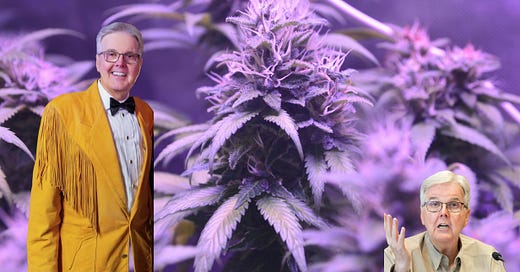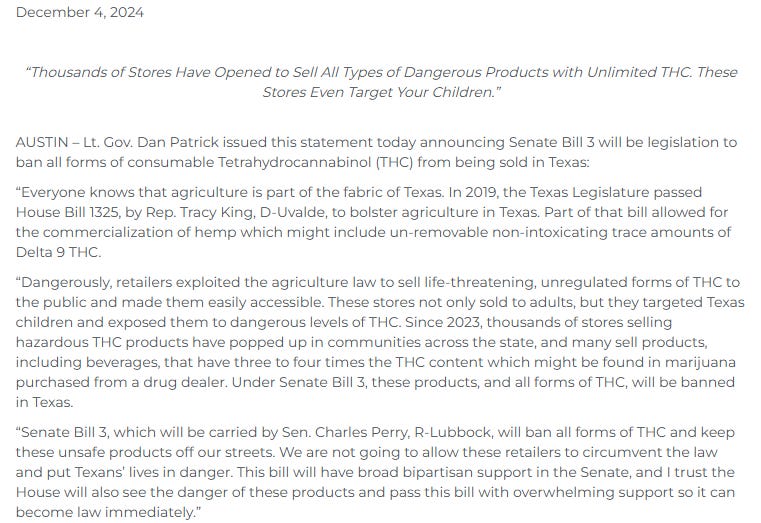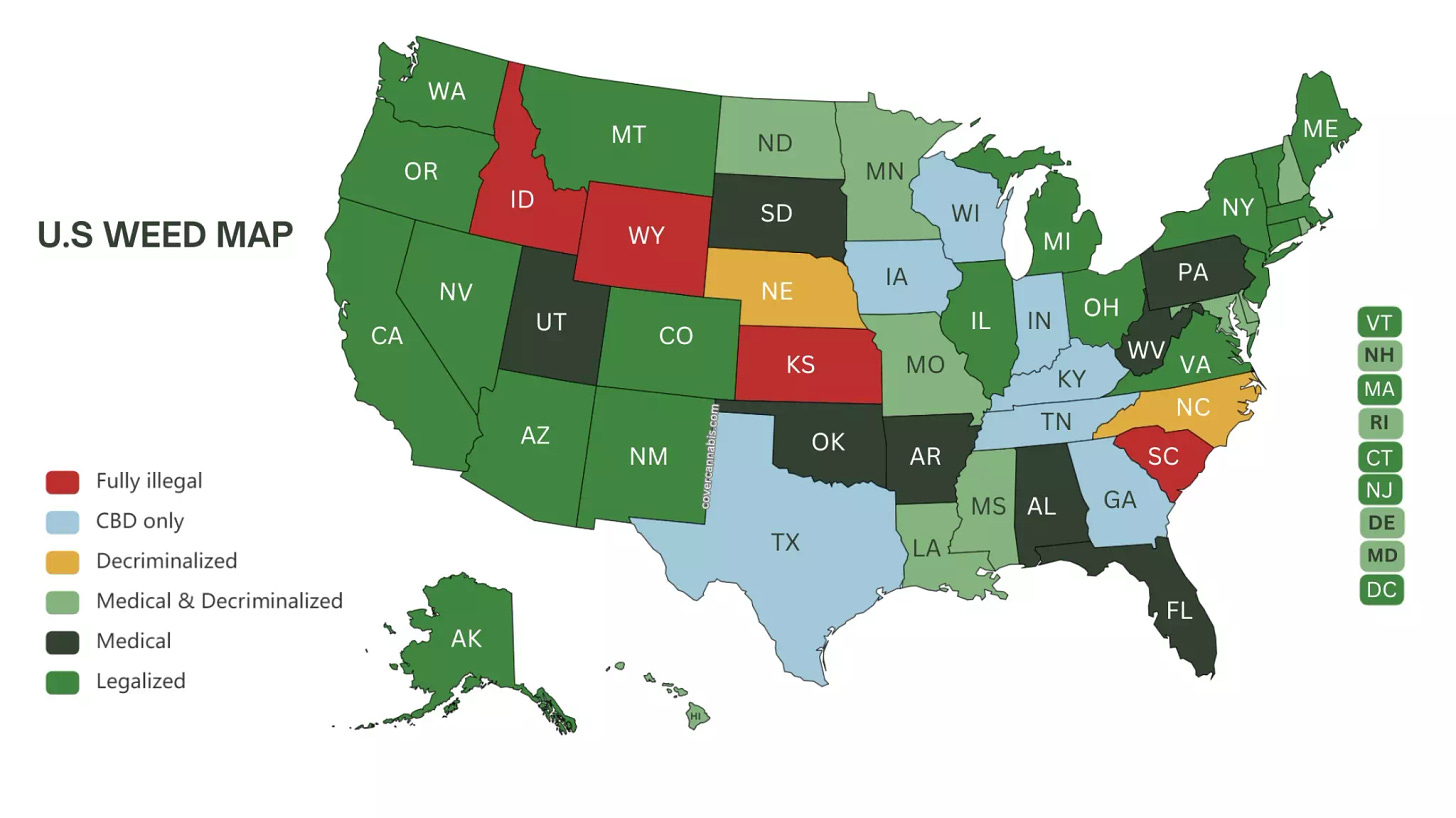
Reefer Madness Has Taken Hold Of Lt. Governor Dan Patrick
How fear, racism, and ignorance is driving Dan Patrick's crusade against THC.
Reefer Madness is a 1936 propaganda film. The film was intended to be a cautionary tale warning parents about the supposed dangers of marijuana use. However, its over-the-top depictions of marijuana's effects and its melodramatic tone have since made it a cult classic, more comedy than cautionary tale.
The original Reefer Madness warned us that teenagers would smoke a little weed and go completely bananas. Turns out, Lt. Governor Dan Patrick doesn’t need to smoke anything—he’s gone full bananas just thinking about it.
This week, Patrick put out a statement, claiming that in the upcoming session, he would ban all forms of THC in Texas.
He claims that retailers are selling “life-threatening, unregulated forms of THC.”
From the United States Drug Enforcement Agency (DEA): No deaths from overdose of marijuana have been reported.
“Have been reported,” as in like, ever. As in like, never ever. No one in history of marijuana has ever died of an overdose of marijuana.
So, when Dan Patrick refers to THC as “life-threatening,” know that he has no clue what he’s talking about. In fact, the war on marijuana began in El Paso, TX in the 1910s and was driven by racism, xenophobia, and economic interests rather than scientific evidence.
Cannabis was widely used in the 19th century as a medicine, but attitudes shifted after the Mexican Revolution in 1910, when Mexican immigrants brought recreational marijuana use with them. The association of cannabis with immigrants led to racialized fear-mongering, with authorities blaming marijuana for violent crimes and societal decay.
Figures like Harry Anslinger, the first commissioner of the Federal Bureau of Narcotics, spearheaded campaigns against marijuana by exploiting racial prejudices. Anslinger infamously claimed that marijuana use led to "Satanic" music and caused white women to seek relations with Black men, using such rhetoric to instill fear and justify prohibition.
This racially charged foundation has perpetuated systemic disparities in marijuana-related arrests and persecutions.
Since 2017, just over 30% of those arrested for possessing cannabis in Texas were Black, who make up 13% of Texas’ population. By comparison, Whites comprise 41% of the state’s population, but only 30% of possession arrests.
According to the National Library of Medicine, past epidemiological studies of race/ethnicity and marijuana use have found that among adolescents, those who identify as White, American Indian or multiracial are more or equally likely to use marijuana than adolescents identifying as Black, Hispanic, or Asian adolescents.
The continuation of marijuana prohibition shows remnants of past prejudices but it’s also an active component of systemic racism. These disparities are not incidental—they are the direct result of policies and enforcement practices designed to marginalize communities of color. Despite the fact that marijuana usage rates are relatively equal across racial and ethnic groups, Black Americans are disproportionately targeted, arrested, and incarcerated for marijuana-related offenses.
This selective enforcement has devastated families, perpetuated cycles of poverty, and stripped countless individuals of opportunities for education, employment, and housing—all over a plant that has been legalized in over 20 states.
The arrest rates in Texas for marijuana isn’t just a reflection of enforcement bias but also a deliberate use of the criminal justice system as a tool for social control. By criminalizing marijuana, Texas lawmakers are maintaining a system that allows for the over-policing of Black and brown communities, ensuring that racial inequality persists under the guise of “law and order.”
A few things to know about Texas and marijuana:
A 2021 UT/TT survey found that 60% of Texans support the legalization of recreational marijuana, with only 27% opposing it.
The same poll showed even stronger support for medical marijuana, with 83% of Texans in favor of its legalization.
Annually, approximately $26,663,800 of Harris County tax dollars are spent on the arrest and prosecution of misdemeanor marijuana offenders.
If Texas stopped arresting and prosecuting individuals for misdemeanor cannabis offenses, it would save an estimated $311 million per year in criminal justice costs.
29% of all drug-related arrests reported in Texas for any given year are specific to marijuana.
Black Texans are 2.6 times more likely to be arrested for marijuana possession than white Texans despite similar usage rates between the two groups.
Racial disparities in marijuana arrests increase in Texas despite overall decline in arrests.
Despite recreational use, specifically of THC, in 2022, the cannabis industry in Texas generated more than $8 billion in revenue and employed more than 50,000 workers.
Legalizing would bring billions of tax revenue into Texas.
Legal cannabis can generate significant tax revenue and create jobs, contributing to the state economy without raising taxes on other sectors. Legalizing cannabis in Texas would add at least $1 billion in tax revenue. What could we allocate that money to? Education? Healthcare? Infrastructure?
By the way, if you didn’t know, all of your local CBD stores and head shops sell THC gummies. Which, at this current time is legal. This is what Dan Patrick wants to outlaw.
Dan Patrick is a 74-year-old Maryland native, and his views on cannabis are as outdated as the prohibitionist propaganda of his youth. Patrick’s regressive ideas seek to perpetuate a system of racial inequality that has plagued Texas for over a century. At a time when we should be moving toward justice, equity, and economic opportunity, Patrick’s agenda takes us in the opposite direction—back to fear-mongering and authoritarian control.
Let’s be clear: Dan Patrick doesn’t believe in freedom or liberty, no matter how often he claims to champion those ideals. His vision of governance is one of control—over our bodies, our choices, and our lives. Texans deserve better than a leader who clings to antiquated ideologies and doubles down on policies proven to harm communities. It’s time for Texas to leave Reefer Madness behind.
December 9: House Administration Committee meets to debate rules.
January 14: The 89th Legislative Session begins.
March 14: The last day Legislators can file bills.
June 2: The 89th Legislative Session ends.
LoneStarLeft’s Newsletter is a reader-supported publication. To receive new posts and support my work, consider becoming a free or paid subscriber.
Follow me on Facebook, TikTok, Threads, YouTube, and Instagram.












Not that I'm a user of THC, but I did try it many decades ago. Seems like a lot of us could use some THC just to survive in this Fascist state. This is the epitome of cruelty to take the last ounce of joy from those who enjoy a little escapism once in awhile.
Ok, Patrick turned 18 in 1968. More people were probably smoking weed in the late 60's forward. Am I to believe he never tried it? Really, I don't know. He was probably such a nerd he didn't drink alcohol either. Of course, he could never do research on the real truth of THC, just spews lies he wants to believe. Paranoia is his drug of choice. Seriously despise him.